Book contents
- Frontmatter
- Contents
- Acknowledgments
- 1 Introduction: Why Look Back?
- 2 How Americans Lost Sight of the State: Adapting Republican Virtue to Liberal Self-Interest
- 3 Between Revolutions: The Promise of the Developmental Vision
- 4 “To Strengthen and Perpetuate that Union”: Republican Political Economy
- 5 Outside the Boundaries: “Powers and Energies in the Extreme Parts”
- 6 The Uncontested State: Letters, Law, Localities
- 7 Restoring “Spontaneous Action and Self-Regulation”: Civil War and Civil Society
- 8 Judicial Exceptions to Gilded Age Laissez-Faire
- 9 “A Special Form of Associative Action”: New Liberalism and the National Integration of Public and Private
- 10 Conclusion: Sighting the Twentieth-Century State
- Index
8 - Judicial Exceptions to Gilded Age Laissez-Faire
Published online by Cambridge University Press: 05 August 2012
- Frontmatter
- Contents
- Acknowledgments
- 1 Introduction: Why Look Back?
- 2 How Americans Lost Sight of the State: Adapting Republican Virtue to Liberal Self-Interest
- 3 Between Revolutions: The Promise of the Developmental Vision
- 4 “To Strengthen and Perpetuate that Union”: Republican Political Economy
- 5 Outside the Boundaries: “Powers and Energies in the Extreme Parts”
- 6 The Uncontested State: Letters, Law, Localities
- 7 Restoring “Spontaneous Action and Self-Regulation”: Civil War and Civil Society
- 8 Judicial Exceptions to Gilded Age Laissez-Faire
- 9 “A Special Form of Associative Action”: New Liberalism and the National Integration of Public and Private
- 10 Conclusion: Sighting the Twentieth-Century State
- Index
Summary
The turmoil that punctuated the Gilded Age occurred during the period of American history that scholars and informed citizens alike equate with anemic governance. Historian Sidney Fine concluded that in the “period between Appomattox and the accession of Theodore Roosevelt to the presidency in 1901, laissez-faire was championed in America as it never was before and has never been since.” The influence of Charles Darwin, interpreted through men like Herbert Spencer and William Graham Sumner, pervaded American thought. Spencer coined the phrase “the survival of the fittest,” and popularized it in England. Sumner was even more pessimistic than Spencer about the implications of Social Darwinism. Sumner called for vigilance against those who would employ state power to ameliorate the inevitable pain that the Darwinian struggle caused.
Darwin's work demonstrated on a cosmic scale the principle of unintended consequences. Until the rise of social evolutionary thought, men explained events by referencing tangible, proximate influences, like the conscious will of other men, or one very remote agent – divine will. An influential exception to this was classical economics, which showed how irrelevant an individual's intention might be to the public consequences of his actions. Individual profit-seeking activities were often the surest path to broad social benefits, proponents argued.
Like classical economics, those who applied Darwin's theories to society did not attribute causality to the conscious intentions of individuals or to divine guidance. But this Darwinian perspective was not confined to one aspect of human life, as was the case with economics. Darwin's evolutionary biology soon served as the basis for theories that explained a broad spectrum of human interaction and even the rise and fall of civilizations.
- Type
- Chapter
- Information
- A Government Out of SightThe Mystery of National Authority in Nineteenth-Century America, pp. 309 - 351Publisher: Cambridge University PressPrint publication year: 2009



